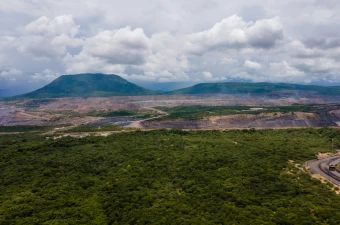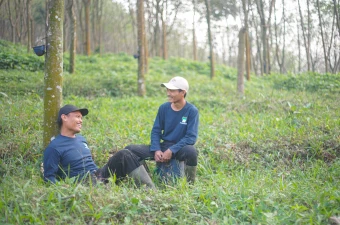
Urgent call to establish a negotation table for a just transition
Thousands of families earn their livelihood from jobs in the mine. Dozens of workers suffer from health problems caused by the work of extracting coal. The region has transformed a large part of its agricultural work and this has resulted in dependence upon mining multinationals. These are just a few examples of the impact the mining company Prodeco has had in Colombia. Therefore, the conditions for this company to leave Colombia must be negotiated in order to protect the rights of workers and communities and to guarantee a fair and just social transition.
The surprising news that the Prodeco Group is returning all their Colombian mining titles to the Colombian authorities (National Mining Agency - ANM) has created quite a commotion in the country. The Prodeco Group comprises Glencore's operations in Colombia for the export of thermal coal.
It’s one of the most important companies in the north of Colombia, where it operates the Calenturitas and La Jagua mines. According to the most important economic newspaper in Colombia, the multinational "reported a production of 15.5 million tons that generated revenues of $ 2.7 billion in 2019."
"In the different scenarios presented to the Ministry of Mines and Energy, the company has always maintained a position of looking for alternative plans to restart activities. They have never shown signs of wanting to hand over their mining title,"
Luis Fernando Ramírez, President of the regional trade union, Sintramienergetica la Jagua de Ibirico.
For some time now, there has been talk of an inevitable closure of the open-cast coal mines in the César region. Since the beginning of the pandemic, the company has had to suspend extractive activities. Despite these setbacks, the multinational's drastic and untimely decision has surprised workers and communities and has set off alarm bells.
"In the different scenarios presented to the Ministry of Mines and Energy, the company has always maintained a position of looking for alternative plans to restart activities. They have never shown signs of wanting to hand over their mining title," says Luis Fernando Ramírez, President of the regional trade union, Sintramienergetica la Jagua de Ibirico.
“This overnight decision to return the mining title has taken us by surprise. It leaves us with the impression that we cannot trust the company. They are always looking for ways to evade complying with agreements previously made with the workers. "
The number of companies having to close in the context of the pandemic is increasing. This hits a sector thought to be immune to the crisis. It is remarkable that the Prodeco group has chosen the strategy of closing down their operations. They have not held any previous informational meetings with their workers, their organizations, or any of the communities in their areas of influence.
Prodeco / Glencore has chosen surprise over transparency towards their stakeholders. This attitude and course of action violate their responsibilities regarding due diligence and transparency of information as set out in the OECD Guidelines for Multinational Enterprises.
Unwaivable labour rights
CNV Internationaal would like to express their deep concern regarding the impact that the closure of Prodeco's mining activities in Cesar, northern Colombia will have on the regional economy and employability. This closure will plunge thousands of workers into uncertainty regarding the future of their employment. This departure from the multinational will not only have huge economic consequences for these workers, but it will also profoundly affect their lives and their families now and far into the future.
Prodeco has given a statement which substantiates their decision to return their mining titles and to shut down their activities in Colombia due to, among other things, the poor performance of international coal prices. The company asserts that "the restart of mining operations is not economically viable."
In a statement, the multinational says that "the Prodeco Group will once again offer their employees a voluntary retirement program which will be significantly higher than what is required under Colombian law." This announcement is far from reassuring for the workers. On the contrary, it fills them with uncertainty. The union organizations have said that an external company is putting pressure on the workers to take advantage of this plan.
"It means a waiver of their labour rights,
their collective benefits, and even the opportunity to pursue lawsuits they might have against the company. The amounts being offered are ridiculous when compared to what they deserve."
(Luis Fernando Ramírez, President of the regional union Sintramienergetica la Jagua de Ibiric)
According to Luis Fernando Ramírez, President of the regional union Sintramienergetica la Jagua de Ibirico, the Prodeco group has hired an external law firm to contact each worker and explain the voluntary retirement plan. This plan, warns Ramírez, "means a waiver of their labour rights, their collective benefits, and even the opportunity to pursue lawsuits they might have against the company. The amounts being offered are ridiculous when compared to what they deserve."
The union leader is speaking out against the enormous pressure being put on the workers. The external consultant is calling the workers 3 or 4 times, trying to “persuade them to make a decision that ignores what the workers have achieved in the course of years of collective struggles and negotiations."
The union organization is against the ways their workers are being pressured. They demand to be included to negotiate these retirement plans so that the rights which have been acquired over the years are protected.

Prodeco has filed a request with the Colombian Ministry of labour to authorize the collective dismissal of workers as a result of the total termination of mining activities. This request shows the true intentions of the company.
The union hopes that the Ministry of Labour will reject this request and that negotiations will be established with all parties.
Who Answers for Sick Workers?
Prodeco’s departure from the mining industry also has implications in regard to pathologies related to mine work. According to Sintradem, the National Union of Sick and Disabled Workers of the Mining Sector, Prodeco is leaving behind many sick workers.
“We have a large number of colleagues in PRODECO who suffer from musculoskeletal and psychiatric diseases, as well as respiratory diseases or pulmonary risk, and even some current cases of possible pneumoconiosis diseases. These diseases and problems are prevalent among coal miners.”
Pneumoconiosis and silicosis are not acquired anywhere but in a coal mine. These diseases occur and develop around mining activity. Crystalline silica occurs for all the sterile material that must be removed in order to be able to extract the coal, which is the product that companies export,” Jairo Córdoba, Secretary General of Sintradem, warns with concern.
The company’s departure from the region and the country will leave the conflict over the classification of certain pathologies as occupational diseases associated with coal mining work unresolved.
Carlos Ochoa, also a member of Sintradem, opposes the diagnoses many of the workers with these pathologies receive. The occupational risk administrators often diagnose them with common diseases. “Then the question remains: How is the national government going to intervene through the Ministry of Labour to guarantee the protection of these rights for workers who are ill right now? Many have reported their illness to the company, but have not yet completed the qualification process to establish the origin of that illness " What will be done about this?
“When the mine leaves, a near ghost town will be left behind, a business of great concern, and workers adrift. Mining has made an important contribution to the region. We believe the State must mediate this process, not only for the benefit of the workers, but for the region and the economy as well."
Luis Fernando Ramírez, Sintramienergetica
Social Dialogue urgently needed to ensure a just transition
Under the promise of prosperity, wealth and well-being, open-cast coal mining arrived in Colombia several decades ago. The regional impact of extractive activities has undeniably, transformed the entire region. The definitive exit of Glencore, owner of Prodeco, is the tip of the iceberg when it comes to the possible impacts of campaigns against climate change. These campaigns strongly urge the world to consume less coal as a source of energy.
This issue should be discussed at negotiating tables that include workers and communities. These negotiations should be led by the Government of Colombia itself. In the words of Luis Fernando Ramírez of Sintramienergetica, “When the mine leaves, a near ghost town will be left behind, a worried business, and workers adrift. Mining has made an important contribution to the region. We believe the State must mediate this process, not only for the benefit of the workers, but for the region and the economy as well."
Prodeco, and therefore the entire international Glencore group, must
- be transparent with information
- convene with all interested parties and organizations that represent them
- respect their previous commitments and agreements
- minimize the negative impact caused by this abrupt closure of operations
We at CNV Internationaal advocate for social dialogue to achieve a just transition for all who will be affected. Both the Glencore group and the coal buyers must take responsibility for the dramatic changes which will result from this closure. The magnitude of Prodeco has had and will continue to have an enormous impact on the communities in Colombia.
Publication date 22 02 2021


